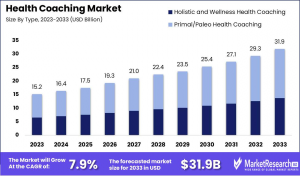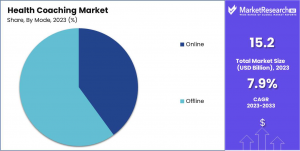Health Coaching Market to Experience Rapid Growth, Projected to Reach USD 31.9 Billion by 2033
The Health Coaching Market was valued at USD 15.2 billion in 2023. It is expected to reach USD 31.9 billion by 2033, with a CAGR of 7.9%
New York, NY – February 07, 2025 – The Health Coaching Market was valued at USD 15.2 billion in 2023. It is expected to reach USD 31.9 billion by 2033, with a CAGR of 7.9% during the forecast period from 2024 to 2033.
The Health Coaching market is witnessing significant growth as more individuals and organizations recognize the importance of personalized wellness programs in managing chronic diseases, mental well-being, and overall lifestyle improvements. Health coaching offers customized guidance on nutrition, fitness, stress management, and behavioral changes, helping people achieve sustainable health outcomes.
With the rising burden of diabetes, obesity, and cardiovascular diseases, government initiatives and corporate wellness programs are driving demand for certified health coaches. The integration of AI-powered digital platforms, wearable health devices, and telehealth services is making health coaching more accessible, scalable, and data-driven.
Online health coaching is emerging as the dominant mode, providing flexibility and convenience. The market is also shifting towards holistic and wellness coaching, incorporating mental and emotional well-being alongside physical health. North America leads the market, driven by high healthcare awareness and corporate wellness investments.
As preventive healthcare gains momentum, health coaching is poised to bridge the gap between traditional healthcare and proactive wellness solutions, improving public health outcomes. Companies are expanding digital coaching solutions and personalized health programs to cater to the growing demand.
Unlock Competitive Advantages With Our PDF Sample Report @ https://marketresearch.biz/report/health-coaching-market/request-sample/
Key Takeaways
- Market Growth: The Health Coaching Market was valued at USD 15.2 billion in 2023 and is projected to reach USD 31.9 billion by 2033, growing at a CAGR of 7.9% from 2024 to 2033.
- By Type: Holistic and Wellness Health Coaching leads the market, driven by the increasing preference for integrative and personalized wellness solutions.
- By Mode: Online health coaching dominates due to its scalability, accessibility, and ability to offer personalized wellness plans.
- By Duration: The Less Than 6 Months segment holds the largest market share, reflecting the demand for quick, result-oriented health programs.
- By Application: General Wellness remains the primary application area, as more individuals seek preventive healthcare solutions.
- Regional Dominance: North America leads with a 45% market share, supported by strong healthcare infrastructure, increasing lifestyle-related health concerns, and corporate wellness programs.
- Growth Opportunity: The market is poised for expansion, driven by rising preventive healthcare trends, government health initiatives, and growing consumer awareness of holistic well-being.
How Artificial Intelligence (AI) is Transforming the Health Coaching Market ?
• AI-Powered Personalized Coaching: AI analyzes health metrics, lifestyle habits, and medical history to generate personalized health coaching programs. Machine learning models adapt plans based on real-time progress, improving outcomes in areas such as nutrition, fitness, and mental well-being.
• Virtual Health Assistants & Chatbots: AI-powered chatbots provide 24/7 support, motivation, and health advice, ensuring continuous engagement. These virtual assistants help users track goals, offer reminders, and suggest personalized interventions based on user data.
• Predictive Analytics for Health Optimization: AI leverages predictive analytics to assess risk factors for chronic diseases and recommend preventive health measures. By analyzing patterns, AI helps coaches create proactive wellness strategies tailored to individual needs.
• Remote Monitoring & Real-Time Feedback: AI-integrated wearables and health apps track vital signs, activity levels, and sleep patterns, allowing coaches to monitor client progress remotely. Real-time feedback improves adherence to health plans and supports better lifestyle adjustments.
• Future Outlook: With AI-powered health coaching platforms, the industry is shifting toward scalable, data-driven, and highly personalized wellness solutions. As AI advances, health coaching will become more efficient, cost-effective, and widely accessible, driving market growth and better health outcomes.
Segmentation Analysis
In terms of segmentation, the Health Coaching Market is divided by type, mode, duration, and application. Holistic and Wellness Health Coaching stands out due to its comprehensive approach encompassing nutrition, stress management, and overall mind-body wellness. By mode, online coaching reigns supreme, offering scalable solutions and reaching a broader audience through digital platforms. In duration analysis, programs lasting less than six months dominate, offering rapid results to individuals seeking swift health improvements.
Application-wise, General Wellness retains a leading market position, as more consumers prioritize maintaining well-rounded physical and mental health. The rising demand in segments like behavioral health and chronic disease management showcases the market's ability to diversify and cater to varying health needs, demonstrating its flexible and dynamic nature.
Market Segments
By Type
•Holistic and Wellness Health Coaching
•Primal/Paleo Health Coaching
By Mode
•Online
•Offline
By Duration
•Less Than 6 Months
•6 Months to 12 Months
By Application
•General Wellness
•Behavioral Health Disorders
•Chronic Diseases
Buy This Premium Research Report: https://marketresearch.biz/purchase-report/?report_id=36177
Market Dynamics
Driver: The increasing prevalence of chronic diseases, such as diabetes and heart disease, has heightened the demand for health coaching services. Health coaching offers personalized guidance to help individuals manage these conditions effectively. Government health agencies, like the Centers for Disease Control and Prevention (CDC), emphasize the importance of lifestyle interventions, including diet and exercise, in preventing and managing chronic illnesses. This focus underscores the critical role of health coaches in promoting healthier behaviors and improving public health outcomes.
Trend: The integration of digital technologies into health coaching is a significant trend. The adoption of digital health tools, such as mobile applications and wearable devices, has transformed how health coaching services are delivered. These technologies facilitate remote monitoring, personalized feedback, and real-time data collection, enhancing the effectiveness of coaching interventions. The National Institutes of Health (NIH) supports research into digital health innovations, recognizing their potential to improve health outcomes and expand access to care.
Restraint: Despite the benefits, barriers exist in adopting digital health technologies within health coaching. Challenges include technical issues, such as lack of infrastructure and technical support, psychological barriers like resistance to change, and concerns about increased workload for healthcare professionals. A systematic review highlighted these obstacles, indicating that infrastructure limitations and technical challenges are significant barriers to the comprehensive adoption of digital health technologies by healthcare professionals.
Opportunity: The growing emphasis on preventive healthcare presents a substantial opportunity for the health coaching market. Government initiatives promoting wellness and disease prevention create a favorable environment for health coaching services. For instance, the U.S. Department of Health and Human Services' "Healthy People" program sets national objectives to improve health and well-being, highlighting the importance of preventive strategies. Health coaches can play a pivotal role in these initiatives by providing personalized support to individuals aiming to adopt healthier lifestyles.
Regional Analysis
North America leads the global health coaching market, accounting for approximately 45% of the overall share. This region benefits from early adoption of digital health tools, high prevalence of chronic diseases, and a substantial number of service providers. Supportive government initiatives promoting preventive healthcare and wellness also contribute to North America’s dominance. Europe holds a significant market share as well, driven by increasing health awareness and digital health coaching trends, particularly in countries like Germany and the UK.
The Asia-Pacific region is emerging rapidly, fueled by urban health consciousness and the adoption of mobile health technologies. In contrast, Latin America and the Middle East & Africa exhibit moderate growth due to improving healthcare infrastructure and lifestyle management awareness, but still encounter challenges related to service accessibility and affordability.
Competitive Landscape
Leading the Health Coaching Market are key players like the Institute of Health Sciences and UK's Health Coaches Association, which are renowned for their educational frameworks and expertise in health and wellness. The Health Coach Institute and The Raw Food Institute focus on the growing trend of holistic wellness, leveraging online platforms to reach a global audience.
Meanwhile, organizations like the Regents of the University of California and the American Council on Exercise strengthen their market position through partnerships with healthcare providers and insurers, seeking to integrate coaching into broader healthcare systems. Innovative players like BrainMD Health and Sears Wellness Institute expand into niche areas such as brain health and family wellness, tapping into new segments with evidence-based practices. These key players are well-positioned to drive the market forward, responding dynamically to consumer demands and technological advancements.
Top Key Players
•Institute of Health Sciences
•UK Health Coaches Association
•Health Coach Institute
•The Raw Food Institute
•Regents of the University of California.
•The American Council on Exercise
•Sears Wellness Institute
•BrainMD Health
•AFPA
•Other Key Players
Emerging Trends in Health Coaching
• Diversity, Equity, Inclusion, and Belonging (DEIB): Health coaching is increasingly focusing on DEIB to ensure that wellness programs are accessible and effective for individuals from all backgrounds. This approach aims to create a sense of safety, respect, and belonging, recognizing that personalized care must consider cultural and individual differences.
• Expansion Beyond Workplaces: While health coaching has traditionally been associated with corporate wellness programs, there is a growing movement to extend these services into communities and personal settings. This shift acknowledges that well-being is a universal need, not confined to the workplace, and seeks to make health coaching more widely available.
• Specialization in Coaching: The field of health coaching is diversifying, with professionals focusing on specific areas such as nutrition, mental health, chronic disease management, and stress reduction. This trend allows coaches to provide more targeted and effective support, catering to the unique needs of different client populations.
Use Cases of Health Coaching
• Chronic Disease Management: Health coaches assist patients in managing chronic conditions like diabetes and hypertension by helping them set realistic health goals, develop action plans, and navigate the healthcare system. This support leads to better health outcomes and empowers patients to take an active role in their care.
• Behavioral Change Support: Coaches work with individuals to identify personal health goals and create strategies to achieve them. This includes providing information, emotional support, and accountability, which are crucial for implementing and sustaining healthy behaviors.
• Integration into Primary Care: Incorporating health coaches into primary care teams has been shown to improve the quality and cost-effectiveness of care. Coaches collaborate with healthcare providers to offer patients comprehensive support, enhancing patient engagement and health outcomes.
Lawrence John
Prudour
+91 91308 55334
email us here
Legal Disclaimer:
EIN Presswire provides this news content "as is" without warranty of any kind. We do not accept any responsibility or liability for the accuracy, content, images, videos, licenses, completeness, legality, or reliability of the information contained in this article. If you have any complaints or copyright issues related to this article, kindly contact the author above.



